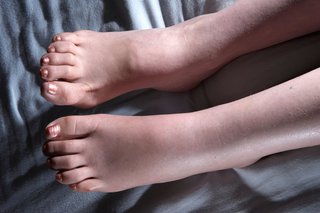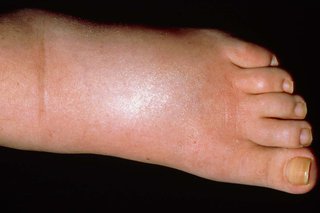Swelling in the ankles, feet or legs often goes away on its own. Talk to your GP if it doesn't get better in a few days.
Causes of swollen ankles, feet and legs
A build-up of fluid, called oedema, can cause swelling in the ankles, feet and legs.
Oedema is usually caused by:
- standing or sitting in the same position for too long
- eating too much salty food
- being overweight
- being pregnant
- taking certain medicines - such as some blood pressure medicines, contraceptive pills, antidepressants or steroids
Oedema can also be caused by:
- an injury - such as a strain or sprain
- an insect bite or sting
- problems with your kidneys, liver or heart
- a blood clot
- an infection
Check if you have oedema
Symptoms of oedema include:


How to ease swelling yourself
Swelling should go away on its own. But there are some things you can try to help.
Do
-
lie down and use pillows to raise the swollen area when you can
-
get some gentle exercise, like walking, to improve your blood flow
-
wear wide, comfortable shoes with a low heel and soft sole
-
wash, dry and moisturise your feet to avoid infections
Don't
-
do not stand or sit for long periods
-
do not wear clothes, socks or shoes that are too tight
Non-urgent advice: Contact your GP if
your ankle, foot or leg is swollen and:
- the swelling is only in 1 ankle, foot or leg and there's no obvious cause, such as an injury
- the swelling is severe, painful or starts very suddenly
- the swollen area is red or feels hot to the touch
- your temperature is very high (38 degrees or higher), or you feel hot and shivery
- you have diabetes
- it has not improved after treating it at home for a few days
- it gets worse
Emergency action required: Call 112 or 999 or go to your nearest ED if:
- you feel short of breath or are struggling to breathe
- your chest feels tight, heavy or painful
You could have a blood clot in your lungs. This needs immediate treatment in the hospital.
Treating swelling and oedema
Treatment for swelling or oedema that does not go away on its own depends on the cause.
It may include lifestyle changes, such as losing weight or going on a low-salt diet.
Content supplied by the NHS and adapted for Ireland by the HSE
